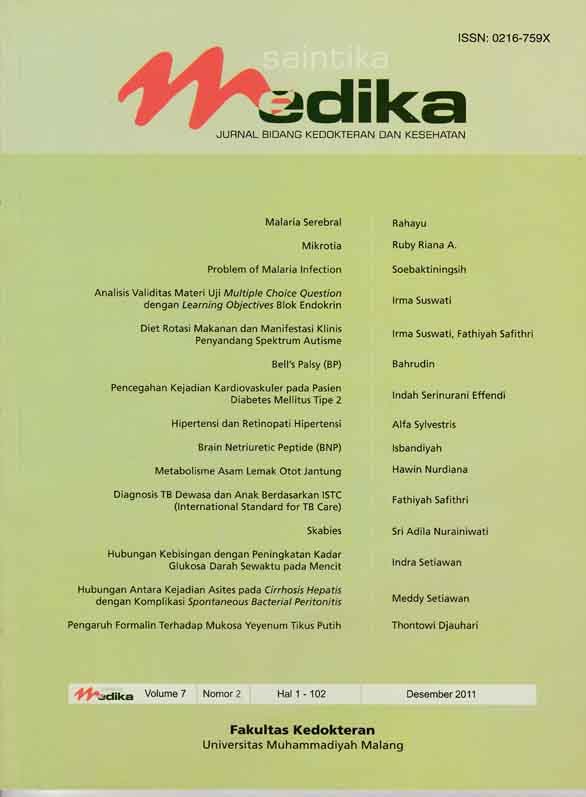Braint Natriuretic Peptide (BNP)
DOI:
https://doi.org/10.22219/sm.v7i2.4076Abstract
Gagal jantung merupakan suatu sindroma klinik dengan tanda dan gejala yang disebabkan disfungsi ventrikel kiri. Untukmenghemat biaya perawatan dan pengobatan diperlukan diagnosis yang cepat dan akurat, serta strategi pengobatan yang tepat, yaitu antara lain dengan mengukur nilai brain natriuretic peptide (BNP). BNP adalah suatu neurohormon jantung, terutama dihasilkan oleh ventrikel sebagai respon terhadap expansi volume ventrikel, tekanan yang berlebihan (overload), dan meningkatnya tekanan dinding ventrikel. Dua metode dalam pemeriksaan BNP, yaitu metode radioimmunoassay (RIA) dan immunoradiometricassay (IRMA) atau fluorescence immunoassay (FI). BNP dapat digunakan untuk diagnosis gagal jantung dengan cepat, untuk membedakan sesak karena gagal jantung dengan akibat penyakit lain, pemeriksaan (screening) gangguan sistolik ventrikular kiri pada pasien setelah serangan infark miokard, sebagai monitoring gagal jantung dan juga indikator prognosis gagal jantung. Nesiritid sebagai human recombinant dari BNP dapat digunakan sebagai terapi pasien gagal jantung. Pada akhirnya BNP tidak bisa mengganti peran ekokardiografi, tetapi sebagai alat pelengkap, hal ini karena BNP tidak dapat membedakan antara disfungsi diastolik dan sistolik dan tidak memberikan informasi tentang kelainan katub dan fungsinya.
Downloads
Download data is not yet available.
Downloads
Published
2017-03-18
Issue
Section
Article
License
Authors who publish with this journal agree to the following terms:
- Authors retain copyright and grant the journal right of first publication with the work simultaneously licensed under a Creative Commons Attribution-ShareAlike 4.0 International License that allows others to share the work with an acknowledgment of the work's authorship and initial publication in this journal.
- Authors are able to enter into separate, additional contractual arrangements for the non-exclusive distribution of the journal's published version of the work (e.g., post it to an institutional repository or publish it in a book), with an acknowledgment of its initial publication in this journal.
- Authors are permitted and encouraged to post their work online (e.g., in institutional repositories or on their website) prior to and during the submission process, as it can lead to productive exchanges, as well as earlier and greater citation of published work (See The Effect of Open Access).

This work is licensed under a Creative Commons Attribution-ShareAlike 4.0 International License.
















